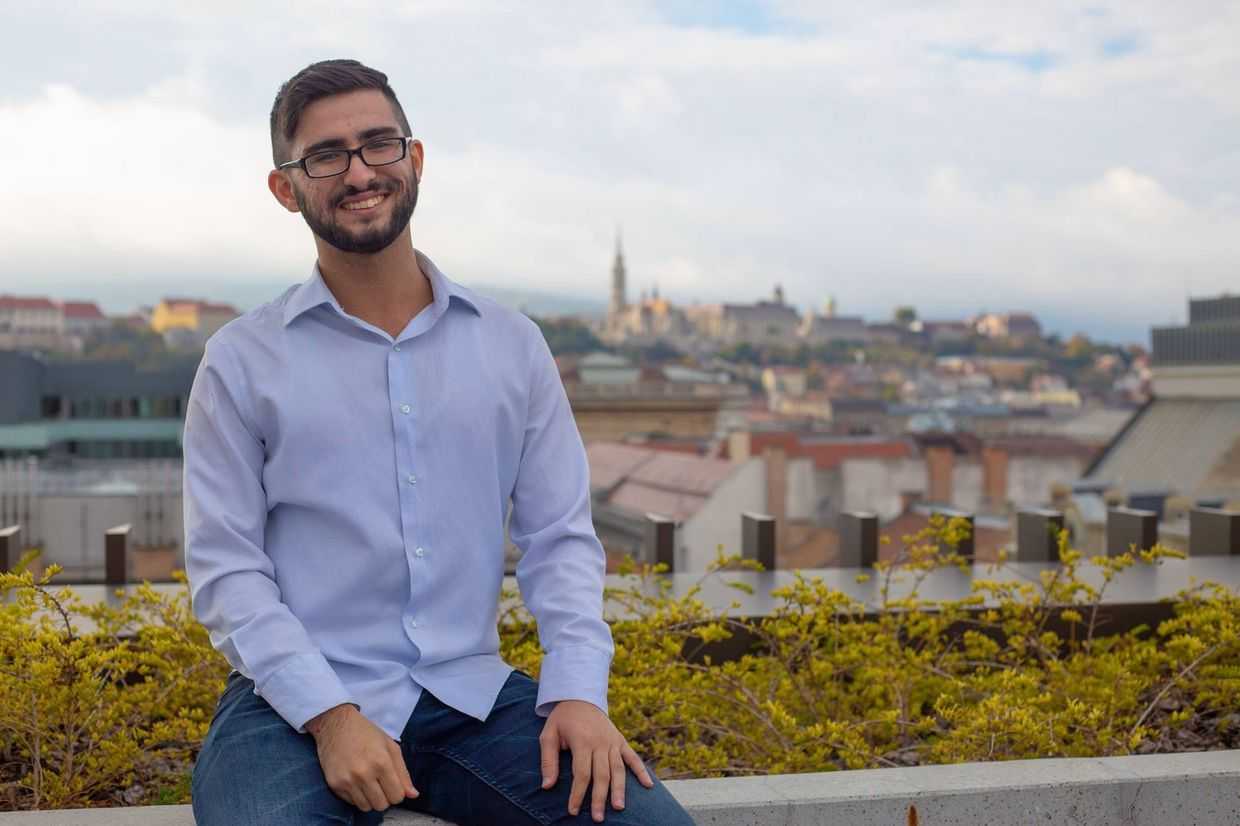
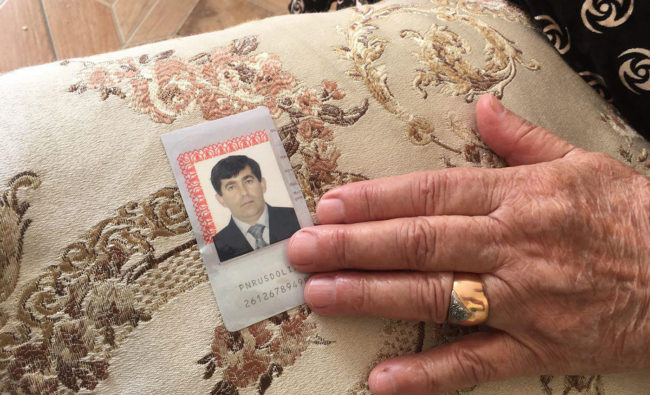

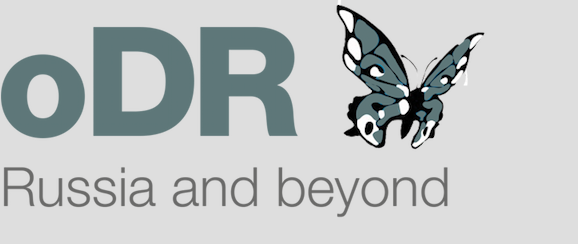 Russia’s anti-extremism centres are notorious for their brutal torture. Here are the stories of its victims in Ingushetia, where for the first time, some of the organisation’s operatives face trial for their crimes.
Russia’s anti-extremism centres are notorious for their brutal torture. Here are the stories of its victims in Ingushetia, where for the first time, some of the organisation’s operatives face trial for their crimes.
At the end of March 2017, Yunus-Bek Yevkurov, head of the Republic of Ingushetia, a region in Russia’s North Caucasus, visited a pre-trial detention centre in Karabulak. As the website of Russia’s Federal Penitentiary Service puts it, Yevkurov ‘visited the main buildings of the detention facility and spoke with suspects, detainees and convicts [incarcerated there].’ Yevkurov was apparently ‘interested in issues of access to medical treatment, nutrition and whether the rights and lawful interests of those held in custody were being respected’.
It’s unclear who exactly Yevkurov spoke to. Timur Khamkhoyev, former head of Ingushetia’s Centre for Combating Extremism (‘Centre E’), and several of his subordinates are currently behind bars at Karabulak. They face charges of extorting and torturing people in detention.
Ingushetia’s Centre E has long had a reputation for torture and murder. The notorious Timur Khamkhoyev has led it since October 2013. ‘I swear — you won’t find anybody worse, anybody dirtier in this republic than that jackal. Did they know about it? I swear on all that’s holy — they all did. From the head [of the republic] to the janitors, they knew all about it!’ seethes Akhmed-Bashir Aushev, elder of the Aushev teip (Chechen and Ingush clan — ed.) Two of Aushev’s relatives suffered at the hands of Khamkhoyev and his men, both named Magomed Aushev.
‘I swear on all that’s holy — they all knew. From the head of the republic to the janitors, they knew all about the torture!’
Relatives of the victims of Ingushetia’s Centre E say that they complained to Yevkurov about police brutality more than once, but he dismissed their concerns. Akhmed-Bashir Aushev claims that in 2014, he personally showed the head of Ingushetia photographs of Magomed Aushev, who then lay in hospital after a severe beating.
‘He told me that I should tell the story again when I turn up in court for slandering our police! Imagine that, the head of our republic said this, Yunus-Bek Bamatgireyevich!’ Such was Yevkurov’s response, in the words of Aushev, when confronted with evidence of torture by the republic’s Centre E. Three years passed before, in May 2017, the Investigative Committee finally brought charges against Centre E’s 44 year-old director Timur Khamkhoyev and departmental head Andrey Beznosyuk, on suspicion of using extreme force against Magomed Aushev.
‘They never took a break’: the Aushev family
Magomed Aushev, 25, came to the attention of the republic’s Centre E after his cousin’s wedding, at which he, in his own words, fired two or three shots into the air with a non-lethal pistol. ‘Rumours soon started that I had fired rounds from a gilded machine-gun’, says Aushev, finding the right words in Russian with difficulty. This, Aushev believes, explains the police’s interest in him. On 20 December 2014, Magomed and his lawyer entered the police station and presented his non-lethal pistol, upon which Aushev was interrogated in connection with illegal arms trafficking. ‘They just said “Hey, why have you brought us a travmat pistol, where’s the machine gun?” And I told them that I didn’t have one’, continues Aushev.
Night fell, and investigator Akhmed Kotiyev told Aushev that he was being detained for 48 hours and would now be taken to a temporary detention facility. At the back door of the police station, Kotiyev handed the young man over to two people in masks. ‘They immediately put a bag over my head, shoved me into a car and brought me straight to Centre E.’
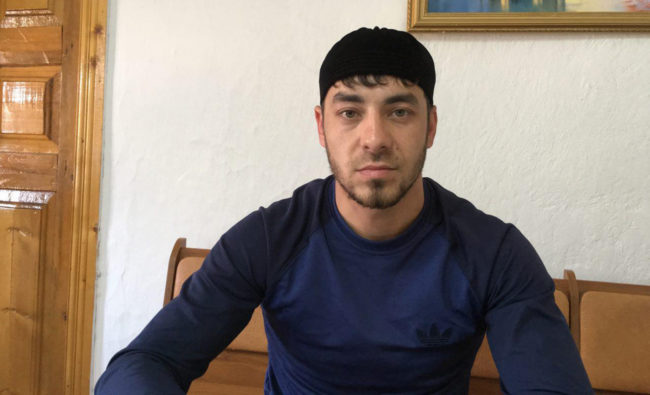
Ingushetia’s Centre E is located in Nazran, the former capital of Ingushetia. Number seven Ozdoyev Street is an unassuming two-storey structure, surrounded by a ten metre high metal mesh fence higher than the building itself. This was where they started beating Aushev, ‘demanding to see the gilded machine-gun’. ‘They beat me all night — they never took a break. They electrocuted me, they beat me in the groin, on the head. They beat me in the kidneys, they beat me in the knees. At times, I caught a glimpse of them through the bag over my head. At one point, they removed it to give me some water.’ And now, three years on, Magomed Aushev has identified Timur Khamkhoyev and several of his subordinates as those who tortured him.
On the second day, he was taken to a prison cell, and from there to the court, where Aushev started to feel unwell. He was then hospitalised. ‘I could barely walk. I passed out and only regained consciousness in hospital’, he remembers. He’s none the wiser as to the criminal case concerning his ‘gilded machine-gun’, which was the pretext for his torture. After being discharged from hospital, Aushev spent another two months in prison and was then simply released. In January 2015 he was recognised as a victim of a violent abuse of authority (Section three, Article 286 of Russia’s Criminal Code), but the investigation into his cases was suspended. It was only resumed this January, after several operatives of Centre E had already been arrested.
‘They came to his mother’s house — with three armoured personnel carriers! On leaving, one of the armed men told her to “complain less” ’
After this, Magomed Aushev was questioned once again, and identified five operatives who had tortured him. However, Aushev’s family was intimidated in an effort to scare him into silence. ‘They came to his mother’s house — and brought three armoured personnel carriers with them! They were masked, armed, in front of small children! They started to search around, frisking everybody. His poor family was terrified — they never expected anything like this!’ exclaims Akhmed-Bashir Aushev. He states that upon leaving, one of the armed men said ‘you should complain less’.
The other Magomed Aushev wound up at Centre E on 16 June 2016, on suspicion of involvement in a car bomb which targeted Ibragim Belkhoroev, one of the leaders of the ‘Batalkhadzhintsy’.
Who are the Batalkhadzhintsy?
The Batalkhadzhintsy are an Ingush Muslim religious group mostly residing in the village of Surkhakhi, infamous for their close ties to the leadership of neighbouring Chechnya. The current leader of the movement, Sultan Belkhoroyev, has described Chechnya’s dictator Ramzan Kadyrov as a ‘messiah and imam who will lead [his people] out of darkness’.
The group came to international notoriety when their involvement in the attack on a bus of journalists and human rights defenders on 9 March 2016 at the Chechnya–Ingushetia border became known. The vehicle was set ablaze, killing everybody inside. According to one source in the Russiangate dossier, the attack was ordered by Adam Delimkhanov, a cousin and close associate of Kadyrov and member of the Duma.
Magomed Aushev’s mother, Aza Ausheva, recalls how the police came knocking early in the morning, though they didn’t find anything incriminating during a search of the house. They then headed down to a ditch behind the house, where they found ‘some kind of package’ (which Aza believes to be the components of a detonator planted there by the security services). Magomed was taken away. ‘Later that evening we discovered that he had been taken to Centre E, and were told that he had been electrocuted. His head and body were swollen, the bridge of his nose broken’, says Ausheva, describing her son’s condition when she saw him in hospital.
‘He told us that a guy started jumping on him, and because you’ve got a bag over your head, you don’t know when to brace. You just exhaust yourself’, says Ruslan Aushev, Magomed’s father. After this torture, the young man, who still hadn’t confessed to anything, was twice released under house arrest, but is now again behind bars. His case is now being examined by the Magas city court.
Relatives of torture victims speak out (Russian). Source: MediaZona.
As Magomed Aushev was being tortured at the building on Ozdoyev Street, another prisoner, Magomed Doliyev, was subjected to the same cruel treatment. In Doliyev’s case, the operatives of Centre E certainly didn’t ‘take a break’. Aushev’s father says his son considered himself lucky. Due to Doliyev’s death, his torturers went a little easier on him. ‘I could hear his cries’, remembers Magomed, ‘and just perhaps, he could also hear mine’.
It’s possible that Doliyev’s death in custody saved Aushev from facing further torture. The corpse of a detainee at Centre E spelt the beginning of the end for Timur Khamkhoyev’s team of torturers.
‘They put a plastic bag over my head and began to choke me’: the Doliyev family
Magomed Doliyev, 49, graduated from a police academy in Almaty, and then went on to work in the police and general prosecutor’s office in Kazakhstan. After his family returned to Ingushetia, Doliyev was offered a job in law enforcement, but he refused. In recent years, he worked in Moscow where, according to his brother Nazir, he led a ‘brigade of Azeris and Uzbeks’. Still, Magomed returned home to Ingushetia fairly often. Meanwhile, his wife Maryem worked as a cashier at a bank in the city of Sunzha.
On the morning of 11 July 2016, an unknown masked man entered the bank. He laid a grenade, which later turned out to be a dud, on the desk where Maryem Doliyeva was working that day. Terrified, she opened the safe, and the criminal made off with over ₽12 million ($200,000). ‘Why didn’t she press the button to sound the emergency alarm? She told me that she was so shocked she couldn’t think of a course of action, and still can’t remember exactly what happened. She feared that the grenade would go off’, explains Nazir Doliyev.
Magomed Doliyev was at home at that time, and both husband and wife were questioned by the police. The case was investigated by the Sunzha District branch of the interior ministry, led by Magomed Bekov. On 15 July, Alisher Borotov (now acting deputy head of Ingushetia’s interior ministry, but in 2016 — the republic’s deputy head of police) ordered operatives from Centre E to investigate.
On that very day at around one o’clock in the afternoon, investigator Timur Khamkhoyev from Centre E phoned Maryem at work and told her to go immediately to the police station. Upon arrival, she was led into Magomed Bekov’s office, where Bekov, Borotov, and Khamkhoyev were waiting for her. ‘I wasn’t even able to collect myself before they started bellowing at me’, she recalls. The men demanded to know where Maryem’s husband was (Magomed was at home), and that she confess to orchestrating a theft at the bank with his assistance (Doliyeva denies the charge.)
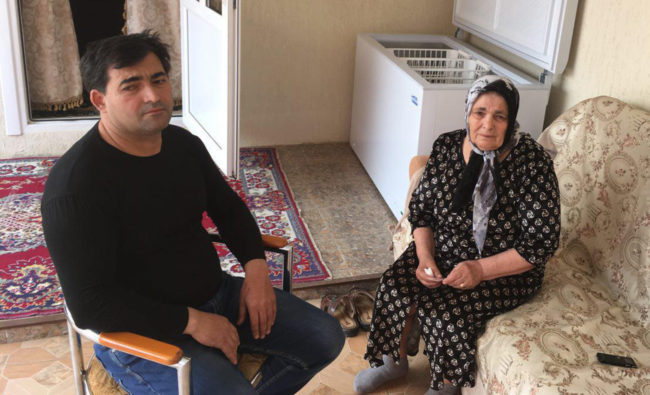
‘They started to shout at me’, she repeated, ‘and Khamkhoyev sprung up and struck me in the face. Then Magomed Bekov took a plastic bag. There was a room nearby, a rest room. He approached me from my right and jammed the bag over my head; he tightened it from the side and started to choke me.’
When the polythene plastic stuck to her face and she started to suffocate, Bekov removed the bag and let Maryem take a breath. ‘As soon as they put the bag on me, they started hitting my face and head. I couldn’t see a thing. They beat me with their fists and their open hands’, she says. When Bekov became tired, other people present took part in the torture. Khamkhoyev and Bekov took turns tightening the bag and choking Maryem.
But despite the torture, Maryem refused to confess and incriminate herself. After a while, the ordeal stopped. ‘They removed the bag and I began to straighten my headscarf, at which point Bekov remarked that “you won’t be needing that anymore”. Five minutes passed. As soon as I had come to my senses, two Russians appeared, who turned out to be Beznosyuk and Sergei Khandogin — guys from Centre E’, recalls Maryem.
The two men took Maryem to the courtyard, where a Lada Granta awaited them. Beznosyuk put another plastic bag on her head, which he’d taken from the office of the local interior ministry branch. Throughout the entire ride to Cenere E’s building in Nazran, her captors once again tried to convince Maryem to confess. ‘As soon as the car stopped, they wrapped tape tightly around the bag, all the way up to my nose. As soon as I raised my hands to straighten it a little, they beat me. They were afraid I’d remove it’, remembers Doliyeva.
Later one of the Centre E investigators asked Maryem whether she could recognise her husband’s voice. ‘Do you want to hear his cries?’ he jeered
Maryem was taken to an office on the second floor of the building, where she was put in a chair, her hands bound behind her with tape. She remembers hearing one of the employees insisting that ‘the chair is too weak, it won’t hold out’. They replaced the chair with another, and attached ‘some kind of wires’ to her fingers, through which she received an electric shock. The 40-year old Doliyeva begins to weep as she retells the torture. ‘Then one of the guys said “that’s not enough for her, you need to increase the dose a little” ’. Her captors then removed the wires from her hands, took off her shoes and socks, and attached them to her toes. ‘The pain was so intense, it hurts to remember it’, she says.
Maryem says that the electric shocks and beatings continued for between six and seven hours, with occasional breaks. Later one of the Centre E investigators asked her whether she could recognise her husband’s voice. ‘Do you want to hear his cries?’ he jeered. Magomed Doliyev was still alive at this point. He had also been taken to the Centre E building in Nazran, from his home in Karabulak.
Maryem Doliyeva then remembers how one of the men poured half a glass of vodka and offered it to her. ‘I told them that I don’t drink. That I can’t drink. They grabbed me, slightly lifted the plastic bag and poured it into my mouth. I guess they wanted me to come to my senses’, says Doliyeva. Not long prior, another Centre E employee had removed the engagement ring from Maryem’s finger and pocketed it. They didn’t torture her any more after that.
‘It turned out that my husband had just been killed. They were probably scared, so left me be’, supposes Doliyeva.
‘I think that with the theft of her engagement ring, Doliyeva’s fate was sealed’, believes the lawyer Andrei Sabinin. ‘I think that they wanted to murder her, take away the body and bury it somewhere. I was afraid that it could end that way’. Doliyeva remembers that during the car ride with Centre E operatives, she was told that she ‘wouldn’t ever return from where we’re taking you’.
But Doliyeva did return, to the town of Sunzha where, not far from the local interior ministry headquarters, the bag was removed from her head and she was given a napkin to wipe a blood from her face. Maryem was picked up from the police station by one of her brothers, who immediately took her to hospital. She didn’t yet know of her husband’s death at Centre E — her brother told her only the following morning.
Nazir, brother of Magomed Doliyev, remembers how he couldn’t locate Magomed the entire day. ‘Towards the evening, my cousin called me to say that my brother was lying in the morgue. How could that be?’
The following day, after all the wounds on his tortured body had been photographed, Magomed Doliyev was buried. The cause of his death was initially recorded as a heart attack. Then the forensic experts acknowledged that Doliyev had died of asphyxiation, most likely strangled by a plastic bag in the manner experienced by anybody who has experienced Centre E.
After the funeral, Magomed and Maryem’s relatives approached Yunus-Bek Yevkurov and demanded a meeting. Yevkurov accepted, but ‘said that he’ll deal with it when the relevant papers land on his desk. He’ll deal with it then. But what document does he need? They killed my brother! I don’t get it’, says Maryem Doliyeva’s brother, exasperated.
Magomed Doliyev’s relatives from the Barkinkhoy teip declared a blood feud against Centre E operative Alikhan Bekov. They were hardly the first family in Ingushetia to have wanted vengeance against Centre E due to the brutal torture their relatives suffered. ‘They declared a blood feud immediately, right on that very day’, says Nazir, casually. ‘And well, declaring a blood feud means that, sooner or later, you have to carry it out — you’ll have to bring him down. [Bekov] in particular. Because he’s responsible for my brother’s death.’
‘Yevkurov said he’ll deal with it when the relevant papers land on his desk. But what document does he need? They killed my brother!’
We’re talking in the yard of the Doliyev family home, where Nazir and Magomed’s mother are receiving guests out in the open. The mother chooses her words with some difficulty, and frequently leaves us to attend to her seriously ill husband — Magomed’s father cannot speak, and is given ten jabs every day. But upon hearing the conversation about his deceased son, he comes out in his pyjamas and sits beside us.
‘I don’t believe in our courts’, sighs Nazir.
The father tries to say something, but he can’t. All he can manage is a terrible, almost inaudible, wheezing sound. He is brought a notebook, over which he labours with a pencil for a long time. The big letters spell out: ‘Now it’s simply fascism’.
An Azerbaijani with connections
The arrest of Timur Khamkhoyev and his team was connected not so much with torture — though their involvement in many violence-related criminal cases over the years has left many witnesses — but extortion. It appears that the criminal case against Khamkhoyev was not initiated by the Investigative Committee, but the FSB. In its reporting on the detention of Khamkhoyev, RIA Novosti underlined the fact that the operation was ‘conducted by the Republic [of Ingushetia] division of the FSB and the central apparatus of the security department of Russia’s Ministry of Internal Affairs’.
According to the investigator, on 9 November 2016, Timur Khamkhoyev and his subordinates in Karabulak forcibly detained a citizen of Azerbaijan and forced him into a Lada Priora. They then brought him to Centre E where, ‘with physical violence, they took possession of his Audi A6 and iPhone 5’. The man was freed, but there was a catch: he had a month to pay ₽800,000 ($13,400) to recover his property and prevent Khamkhoyev’s men from publicising evidence of ‘his romantic relations with a woman of Ingush ethnicity’.
The victim, Amil Nazarov, 35, appealed to the law enforcement agencies. In this case, they reacted with unexpected diligence. Khamkhoyev and several of his men were detained at the start of December 2016. During a search of one of the policemen’s homes, investigators found several dozen bullets, and at another’s, the stolen Audi A6. At first, the detainees were charged with theft — then the case against them was changed to extortion and exceeding their official authority.
The word in Ingushetia is that Amil Nazarov worked for Abubakar Malsagov, who served as the Republic’s Prime Minister between September 2013 and November 2016. ‘Khamkhoyev wasn’t arrested for Doliyev’s murder, I’ll tell you that much’, says Akhmed-Bashir Aushev. ‘So they shook down some Azerbaijani guy or committed a theft, whatever. But this particular Azerbaijani had the Prime Minister’s protection, and maybe even worked for him. And when that kind of thing comes to light over here, people get scared. So they were frightened, and detained Khamkhoyev.’
A former employee at Ingushetia’s Ministry of the Interior, Khasan Katsiyev, claims that the woman with whom the Azerbaijani had relations was specially ‘sent’ by Khamkhoyev to set up a blackmail. ‘Her name is Aza Gadiyeva, and this is the number one fraud in the republic. The department for fighting corruption and economic crimes at the local interior ministry developed cases against her several times, but none of them reached their logical conclusion — because Timur Khamkhoyev personally covered for her. Khamkhoyev had her back and, according to some, she lived in a rented flat in Magas. Allegedly this flat was provided to her by Timur Khamkhoyev’, says Katsiyev.
Several people who wished to remain anonymous said that operatives of Centre E blackmailed the Azerbaijani citizen with video recordings of his meeting with Gadiyeva. These ‘fighters against extremism’ then threatened to send these recordings to the woman’s relatives which would, in their words, inevitably lead to Nazarov’s murder.
Aza Gadieva was accused of fraud and involvement in a criminal organisation, which illegally gained possession of and cashed maternity capital certificates to the value of ₽42 million ($700,000). In April 2016, the prosecutor general sent her case to court, noting that Gadiyeva had pleaded guilty and so had began discussions for a pre-trial cooperation agreement with the authorities. Yet in November, with investigations well underway, Gadiyeva suddenly disappeared, and the trial resumed only three months later. ‘Khamkhoyev was brazenly corrupt’, concludes Katsiev. ‘That’s how he was able to extort the Azerbaijani, but there are many more such cases.’
Centre E was also engaged in another form of extortion. Several sources of MediaZona said on condition of anonymity that Centre E employees also scoured Ingushetia for LGBT people and then threatened to out them were their demands not met.
Centre E behind bars: a team to the end
A criminal case on the death of Magomed Doliyev and the use of violence against his wife Maryem began almost immediately, in June 2016. However, the operatives of Centre E were initially treated only as witnesses. It was not until December that charges were brought against Timur Khamkhoyev, who was already in pre-trial detention accused of extortion, and Alikhan Bekov. This January saw charges against deputy director of Ingushetia’s Centre E, Sergey Khandogin and director of Sunzha District’s department for internal affairs Magomed Bekov. Andrey Beznosyuk, departmental head of Centre E, was finally charged in February.
All these men are accused of exceeding their authority and using violence. All of them apart from Alikhan Bekov participated in the torture of Maryem Doliyeva. Alikhan Bekov who, according to the investigation, strangled Magomed Doliyev, is also accused of murder.
None of the accused has admitted their guilt. In the words of the victims’ relatives, these former employees of Centre E are bold and stick together, threatening to ‘sort things out’ when the charges against them are dropped. ‘Even during questioning [by the investigators], they’re smug and impertinent. They felt that they were strong, and above the law. Even now when the writing is on the wall, they still won’t give up’, says Maryem Doliyeva. At times her voice shudders. Her eyes well up with tears.
Her brother says that the relatives of the accused offered money in exchange for refusing to testify in court, and ‘sent the family elders’ who said they were ready to swear on the Koran that their relatives didn’t touch Maryem. ‘They can do anything. They wouldn’t think twice before telling bare-faced lies while swearing on the Koran’, he insists.
‘Even behind bars, Khamkhoyev feels invulnerable. He promised me that if I wrote a word about him, he would tear off my arms and legs’
‘Even behind bars, Khamkhoyev feels invulnerable’, says the human rights defender Magomed Mutsolgov. ‘In February I approached him in his cell, in my capacity as a member of the Public Monitoring Commission [a formerly independent prison watchdog active in over 80 Russian regions] and the first thing he said was “Why have you brought him to me? As if this place is supposed to be a sanatorium!” He also promised me that if I wrote a word about him, he would tear off my arms and legs. After that, I filed a declaration with the investigative committee that I had been threatened with violent reprisal. They refused to accept it, saying that Khamkhoyev’s words had just been a figure of speech.’
For a long time, Magomed Bekov was held under pre-trial detention, unable to leave. However, at the end of March after a complaint by lawyer Andrey Sabinin, he was placed under house arrest instead. ‘So, why did they let Bekov return home? The investigator demanded it, as their boss [Khamkhoyev] apparently wouldn’t leave his subordinates alone’, supposes Maryem Doliyeva’s brother.
Sergey Khandogin, who became Khamkhoyev’s deputy in April 2016, had been transferred to Ingushetia from the odious Centre E branch in Nizhny Novgorod. After his detention, Khandogin was also confined to pre-trial detention, but the investigator also released him on house arrest. Khandogin subsequently went into hiding and was wanted for two months.
No charges were brought against Alisher Borotov, who gave the order for his Centre E colleagues to provide operational support for the robbery or Rosselkhozbank. Yet Doliyeva confirms that he was also present during her torture at the Sunzha District’s department for internal affairs, and helped others to choke her with a plastic bag. Following the arrest of Timur Khamkhoyev, Borotov has even got a promotion — he is now Ingushetia’s acting chief of police, thus deputy to the republic’s new minister of internal affairs Dmitry Kava, whose predecessor Aleksansdr Trofimov resigned after arrests began in Centre E.
A policeman’s torture. ‘Take him away and get to work on him’
Khasan Katsiyev, who worked in the anti-corruption department of Ingushetia’s Ministry of Internal Affairs, also fell victim to torture at Centre E. On 21 February 2014, Katsiyev recalls, he was summoned for a meeting by deputy chief of police Alisher Borotov in the ministry of internal affairs in Magas. When he entered Borotov’s office, he found Timur Khamkhoyev waiting for him with four subordinates. ‘Take him away and get to work on him’, ordered Borotov, with a nod to Centre E’s notorious director.
Khamkhoyev’s men took Katsiyev through the cellar, across the courtyard and into a waiting car, which drove him to Centre E’s premises in Nazran. ‘It began there and then, on the first floor of that building’, remembers Katsiyev. The Centre E operatives viciously beat the policeman and smashed his head against the concrete floor, all the while demanding that he sign a confession that he “extorted money from certain persons”. At one moment he heard a command from Khamkhoyev to ‘get our shovels and our jeep ready!’. ‘It seemed to me that this wasn’t the first time they’d buried a body’, says Katsiev.
But the policeman wasn’t facing an open grave. As Katsiyev sat with a bag over his head, a group of people came who introduced themselves as members of the Interior Ministry’s own security services, or USB. Once again, Katsiev refused to incriminate himself, nor to answer their questions. ‘Timur, this guy isn’t telling us what we need. Get to work’, Katsiev heard the men to Khamkhoyev. The torture continued.
‘Borotov walked out into the corridor, saw me covered in blood, burst out into laughter, and walked away’
Towards the evening of the next day, having had no success with the policeman, his torturers took Katsiev back to the Ministry of Internal Affairs in Magas. ‘Borotov walked out into the corridor of the security services, saw me, burst out into laughter, and walked away’, he recounts. There, the USB once more demanded that Katsiev sign either a confession or an agreement to cooperate with them. When it turned out that Katsiyev was again destined to return to Centre E, he was able to quickly send an SMS message to a friend in the police force. After the friend intervened, Katsiyev was released.
Katsiyev lost consciousness in the courtyard of the Interior Ministry, where two security guards dragged him to his brothers’ car which was waiting at the gates. He only came to in a hospital in Grozny, capital of neighbouring Chechnya. Katsiyev’s relatives had taken him there, fearing that members of Ingushetia’s Centre E could have undue influence on the doctors at home.
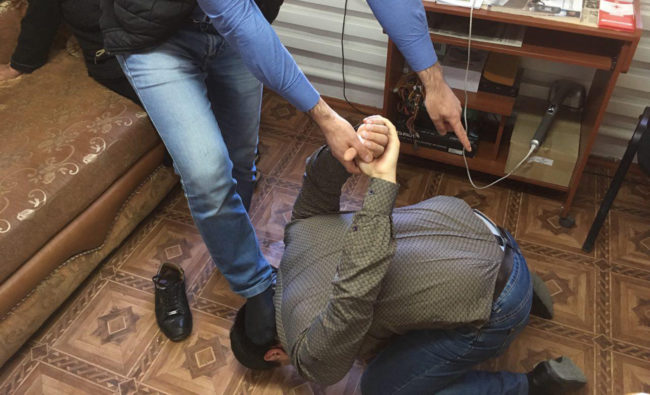
The now former police officer Katsiyev stresses that he signed no documents, but was dismissed from his post ‘at his own will’ during the month spent in hospital. Katsiyev says that his conflict with the leadership of the anti-corruption department was sparked by his investigations into corruption scandals. While working on a criminal case, he says, he discovered that his department’s leadership was implicated in an extortion scheme ‘under the protection’ of Ingushetia’s Minister of Internal Affairs Aleksdandr Trofimov.
Furthermore, Katsiyev discovered that construction firms were paying kickbacks to high-ranking police officers. He also confirms that the report in which he described this corrupt scheme, as well as audio recordings which confirmed bribe-taking, disappeared from his safe after being tortured at Centre E.
‘My son fell out of favour’, says the ex-policeman’s father Magomed Katsiyev, ‘[His superiors] decided that if he stayed in the police force, then every last one of them could be implicated somehow. Katsiyev had to be kicked out. And why was he put into Centre E’s hands? Because my son divulged to his department and its employees that Timur Khamkhoyev of Centre E frequently “extorted money from certain persons” ’.
A criminal case on Katsiev’s torture has since been filed, though nobody has yet been brought to justice — despite the fact that in one of his resolutions, the investigator officially named the scene of the crime as the premises of Centre E in Nazran, Ingushetia.
‘They’ve been kidnapping people for many years, right?’
‘It seems to me that these people have never answered for anything’, says Magomed Mutsolgov, a prominent human rights defender in the republic.
‘Impunity. They felt themselves to be above the law acted with impunity. Carrying out these acts… that didn’t require official orders of any sort, just some informal instructions. After all, they’ve been kidnapping people for many years, right? These crimes were committed on an enormous scale — you wouldn’t believe it, but 236 people have been abducted here in Ingushetia and none of them has yet been found.’ In Mutsolgov’s words, these years of impunity and criminality by the security services demonstrate that ‘the regional authorities don’t even demand that they adhere to the law — in fact, they just pander to them’.
Mutsolgov fears that ‘there will be attempts to hinder and even freeze’ the ongoing case against the Centre E operatives. ‘Here there’s the understanding of “people of the system” — of an ostensible system of government. But that’s not true; what system is meant? These officials, particularly in the regional authorities, build their own power structures beneath them and apply the systems of law enforcement and legal authority as they see fit.’
‘You can’t try and make a mark on these people, to shame them into being better’, laments Akhmed-Bashir Aushev. ‘Take these 30 guys from Centre E, and I swear that you won’t find one of them without sin.’ The number of accused has now risen to more than ten operatives of Centre E, under Timur Khamkhoyev’s leadership.
At the end of May, Ingushetia’s Investigative Committee combined the five criminal cases brought against Centre E’s men into one. Andrei Sabinin, the lawyer who is representing some of the victims on the initiative of the Memorial Human Rights Centre, adds that now the cases of Magomed and Maryem Doliyev(a), the Azerbaijani citizen Amil Nazarov, the two Magomed Aushevs, Zelimkhan Mutsolgov and Adam Dakiyev will all be investigated as one.
‘In a small republic like Ingushetia, these actions would have been impossible without the Investigative Committee’s inaction and protection from the regional leadership’
Adam Dakiyev was abducted and tortured in 2012. He says that upon being released from Centre E, Timur Khamkhoyev told him that he should be thankful to leave alive — few are so lucky. Mutsolgov himself was tortured in 2010. ‘Well, how did you like our Taekwondo?’ his torturers apparently asked him.
Sabinin also complains that as of yet, nobody has been brought to justice ‘for the torture of former police officer Khasan Katsiyev, even though he identified his assailants on several occasions’.
‘Over the course of several years, those at the higher echelons of Ingushetia’s police have tortured their own citizens with utter impunity, and despite their obvious culpability, continued their criminal activities. There is no doubt that in a small republic like Ingushetia, such actions would have been impossible without the clear inaction of the Investigative Committee and a level of protection from the regional leadership’, concludes Sabinin. He stresses that victims appealed to Yunus-Bek Yevkurov on several occasions, but the Ingush leader ‘took no steps whatsoever to establish the identity of the perpetrators and bring them to justice’.
‘Why the judgements of the Investigative Committee’s investigative department are so selective remains unclear’, notes the human rights defender. ‘It still hasn’t provided a legal assessment of the actions of Lieutenant Borotov, who was identified by Doliyeva as one of her torturers. Even more worrying was the decision of the supreme court of Ingushetia to release Sergey Khandogin under house arrest, despite the fact that the accused’s name is still on a federal wanted list.’
‘Some of these police have completely lost their minds. And I hope that soon, we can cut the tentacles of their criminal organisation out of the law enforcement agencies’, remarks Sabinin.
The article is a partner post written by Yegor Skorovoda and Sergey Smirnov that first appeared on the website Mediazona. It was translated from Russian by Maxim Edwards for Open Democracy Russia.


